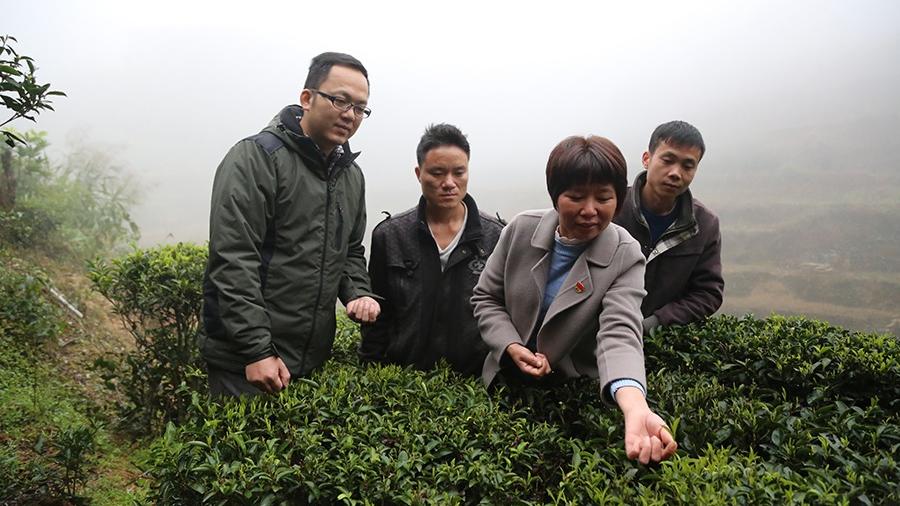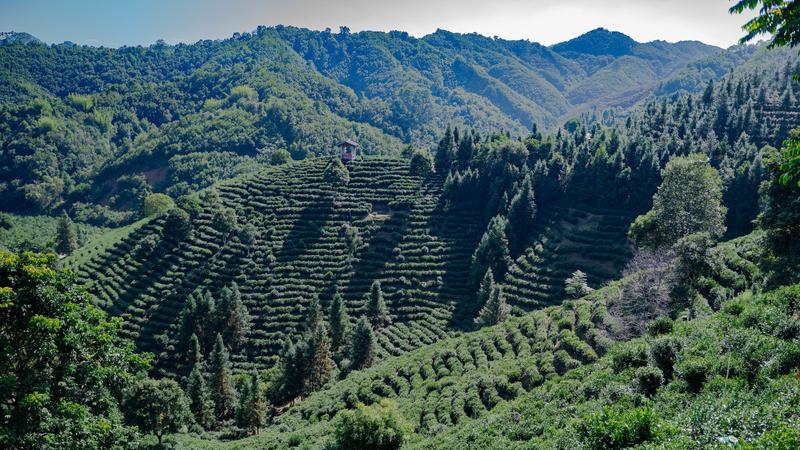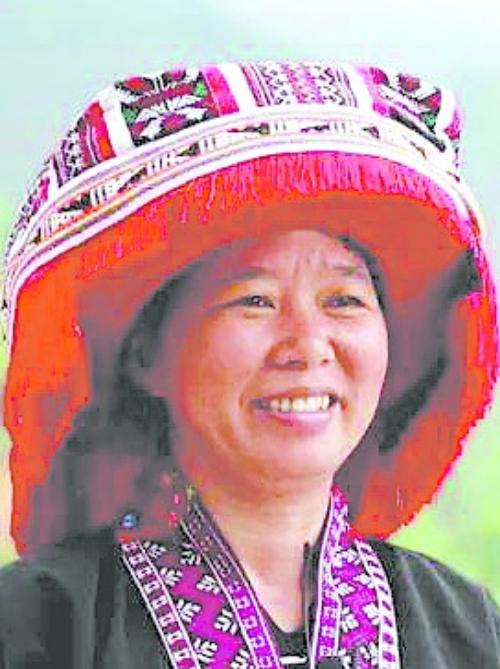 Zhu Xuelan instructs tea growers in Shanping village in the Guangxi Zhuang autonomous region's Liubao town. (PHOTO PROVIDED TO CHINA DAILY)
Zhu Xuelan instructs tea growers in Shanping village in the Guangxi Zhuang autonomous region's Liubao town. (PHOTO PROVIDED TO CHINA DAILY)
![]()
Fifty-year-old Zhu Xuelan has generously shared her family recipe for making Liubao tea, a traditional dark tea in the Guangxi Zhuang autonomous region with a history of over 1,500 years, to help the villagers there live a better life.
Zhu is a delegate to the upcoming 20th National Congress of the Communist Party of China.
Zhu Xuelan is not only gifted in growing and making teas, but since 2008 has also served as Party secretary of the Guangxi Zhuang autonomous region's Shanping village in Cangwu county, a once undeveloped area with 95 percent of its residents being ethnic Yao - one of China's ethnic minority groups.
She is not only gifted in growing and making teas, but since 2008 has also served as Party secretary of the region's Shanping village in Cangwu county, a once undeveloped area with 95 percent of its residents being ethnic Yao - one of China's ethnic minority groups.
"I watched and learned how to grow and make teas from my grandparents since my childhood," she said.
As the fourth-generation inheritor of her family's tea-making skills, Zhu has formed her own method of growing, making and storing tea. "But I didn't think it was good enough when I was the only one mastering the skills. It will be better when more villagers get to know how to make the tea," she said.
ALSO READ: Good wishes expressed for Party congress
However, her idea of teaching the villagers to make the tea was opposed by her family members, who treasured the skills as a secret recipe that would bring fortune to the family.
"I've persuaded them for quite a long time, telling them that the tea-making industry won't enjoy a promising market as long as more residents here don't learn the skills and introduce the tea to other places," she said. "Thankfully, they agreed at last."
 This undated file photo shows the green tea terraces in Liubao. (PHOTO PROVIDED TO CHINA DAILY)
This undated file photo shows the green tea terraces in Liubao. (PHOTO PROVIDED TO CHINA DAILY)
According to Zhu, Shanping was a formerly impoverished village due to lofty mountains and poor transportation. She then took the lead to build roads by gaining financial support from the local government, which laid a foundation for the future transport of Liubao tea
She said that she started to teach the villagers how to make Liubao tea around 2013 and so far she has over 20 "students"."I feel very happy that more villagers have learned the skills and made money by selling tea. My efforts paid off."
According to Zhu, Shanping was a formerly impoverished village due to lofty mountains and poor transportation. She then took the lead to build roads by gaining financial support from the local government, which laid a foundation for the future transport of Liubao tea.
"I'm a daughter of the mountain and also a Party member. I won't let anyone, young or old, be left behind in our journey out of poverty," she said. In 2016, Shanping village officially shook off poverty thanks to the development of the Liubao tea industry.
ALSO READ: Plantations cultivate poverty alleviation in a Guangxi village
So far, the village has over 107 hectares for growing tea, with its yield over 35,000 kilograms per year.
"The village has 501 people in 118 households. Now, their average annual income is around 20,000 yuan (US$2,850)," she said.
In 2018, Zhu was recognized as one of the region's inheritors of making Liubao tea, which is included in the region's intangible culture heritage campaign.
In 2018, Zhu was recognized as one of the region's inheritors of making Liubao tea, which is included in the region's intangible culture heritage campaign
Her efforts and devotion to helping the village shake off poverty also won her many other awards granted by the local government and central departments.
She was one of those awarded the title of March 8th Red-Banner Holders in 2020 - one of the nation's highest honors for women for their outstanding work and contributions.
ALSO READ: A tea town infused with prosperity
In 2021, she was honored for her excellent performance in poverty alleviation work led by the central government.
"I really cherish these honors and I will continue to improve my work to lead the villagers toward a better life," she said.
In addition to putting her efforts into developing the tea industry in the village, Zhu has also worked on caring for left-behind children in the rural areas and vitalizing the village by developing rural tourism.
 This undated file photo shows Zhu Xuelan, Village Party secretary in the Guangxi Zhuang autonomous region. (PHOTO PROVIDED TO CHINA DAILY)
This undated file photo shows Zhu Xuelan, Village Party secretary in the Guangxi Zhuang autonomous region. (PHOTO PROVIDED TO CHINA DAILY)
In addition to putting her efforts into developing the tea industry in the village, Zhu has also worked on caring for left-behind children in the rural areas and vitalizing the village by developing rural tourism
"There are dozens of children in my village whose parents work outside of the county or region, leaving them to their grandparents. I'm really concerned for their education, as their older grandparents can't give them guidance on homework and school lessons," she said.
"I've submitted my proposals to the upper-level departments to call for more attention to these children. We can figure out ways to help their parents land jobs near the village to let them take better care of their children."
READ MORE: Tea tourism revives village
She also wishes to develop rural tourism in the village, which boasts rich ethnic culture. In December 2017, she joined up with a performance team and organized the village's first ethnic Yao cultural festival.
The village cooperated with a company from Shenzhen, Guangdong province in 2020 to develop rural homestays and leisure events like picking tea to vitalize the village's tourism.
"It's an ideal state that we can combine the tea industry with ethnic Yao culture and tourism to drive the village's future development," she said.


